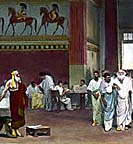 "The Latin alphabet derived from the Etruscan, which was adopted from the Greek of colonists who had settled at Cumae in Campania. An indication of this borrowing is that the sound of k was conveyed by three different letters: gamma (G) before e and i, kappa (K) before a, and koppa (Q) before u. (Indeed, that is their names: ce, ka, qu). In Latin, kappa soon became redundant, except in the archaic spelling of such words as Kalendae (the first day of the Roman month), and was dropped from the alphabet. And Q was restricted to cases in which it preceded u. Principally, it was gamma, the third letter in the Greek alphabet and represented by the letter C in Latin, that conveyed the sound of k.
"The Latin alphabet derived from the Etruscan, which was adopted from the Greek of colonists who had settled at Cumae in Campania. An indication of this borrowing is that the sound of k was conveyed by three different letters: gamma (G) before e and i, kappa (K) before a, and koppa (Q) before u. (Indeed, that is their names: ce, ka, qu). In Latin, kappa soon became redundant, except in the archaic spelling of such words as Kalendae (the first day of the Roman month), and was dropped from the alphabet. And Q was restricted to cases in which it preceded u. Principally, it was gamma, the third letter in the Greek alphabet and represented by the letter C in Latin, that conveyed the sound of k.
But C also had the sound of g and, since gamma already represented k, a new letter was added to distinguish between these two values. Plutarch (Quaestiones Romanae, 54, 59) attributes its introduction (in the third century BC) to Spurius Carvilius Ruga, a freedman whose grammar school was the first to charge a fee (he also was the first Roman to divorce his wife). The letter continued to represent the sound of k but, by adding a stroke to C, Carvilius created the letter G to denote that sound. Its older value survived, however, in the abbreviations for Gaius (C.) and Gnaeus (Cn.). The seventh letter in the Latin alphabet, G took the position originally held by Z (zeta), which had no equivalent value in Latin and was discarded.
The introduction of the new letter also has been attributed to Appius Claudius Caecus, Roman censor in 312 BC. According to Martianus Capella (De Nuptiis Philologiae et Mercurii, III.261), 'Z was abhorrent to Appius Claudius, because it resembles in its expression the teeth of a corpse,' that is, in sounding the letter the lips pulled over the teeth looked much as they would in the rigor of death. More prosaically, the loss of Z may have been due to rhotacism, in which the s sound it represented was transferred to r (for example, Fusius becoming Furius), a replacement that consequently made the letter unnecessary."
No comments:
Post a Comment